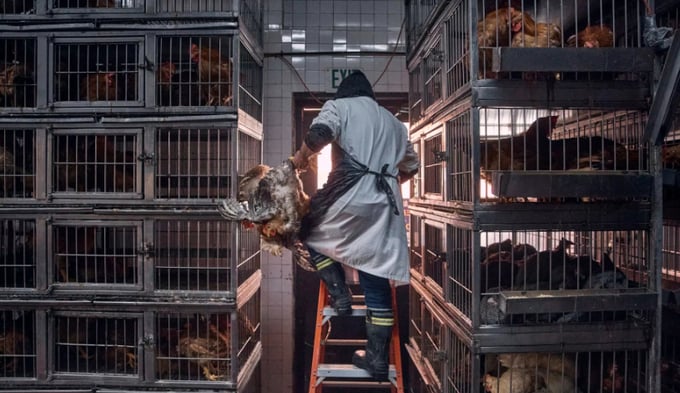December 4, 2025 | 00:19 GMT +7
December 4, 2025 | 00:19 GMT +7
Hotline: 0913.378.918
December 4, 2025 | 00:19 GMT +7
Hotline: 0913.378.918

There have been 68 confirmed cases in humans and one death in the US but no reported spread between people.
Three cow veterinarians have tested positive for bird flu antibodies in the United States, according to a new study that suggests not all virus infections are being detected.
The current outbreak of avian influenza (H5N1) in dairy cows in the US was first reported in March 2024 and has now spread to 968 dairy herds, according to the Centers for Disease Control and Prevention (CDC).
There have been 68 confirmed cases in humans and one death in the US but no reported spread between people.
In a newly released CDC study, 150 cow veterinarians in the US and Canada had their blood tested for avian influenza antibodies to determine if they had a recent bird flu infection.
Out of the three US veterinarians who were found to have antibodies for the virus, none of them reported previous symptoms of influenza or conjunctivitis, which is often a symptom of human bird flu infections.
This suggests that monitoring only symptomatic exposed workers may “underestimate human infection,” the CDC said.
None of the veterinarians had worked with cattle that had a suspected bird flu infection, although one person had worked with infected poultry. One of the practitioners had provided care to cows in states without reported bird flu infections in cows or humans.
This means that dairy cattle could be infected with bird flu in states where the virus has not yet been identified in cows.
Rowland Kao, a professor of veterinary epidemiology and data science at the University of Edinburgh in the UK, told Euronews Health that the findings were “not that surprising” but it does mean it may be harder to “completely eradicate” the outbreak. “Every time a human gets infected, there’s a chance of either a direct evolution of the virus or a recombination with seasonal flu, and we’re not yet at the stage where we think that’s so unlikely that we can be relaxed about it,” Kao added.
The CDC said the cases highlight the “importance of rapid identification of infected dairy cattle through herd and bulk milk testing as recently announced by the US Department of Agriculture”.
H5N1 has been spreading globally among wild birds and poultry, and scientists have been closely monitoring the virus for any changes that might allow it to spread between humans. While widespread in birds, cases of the virus are rare in humans.
We’re in a phase with bird flu where “it's too early to say what the long-term implications are,” Kao said.
“We know that it's doing things that bird flu hasn't done before in terms of the species that it's affecting; geographically, the fact that it's circulating in quite an unusual way through mammals in South America, [and this all tells] us that there's the potential for further surprises and we don't like surprises,” he added.
There have been no infections in humans or cattle in European countries so far, according to the European Centres for Disease Prevention and Control (ECDC).
In its last communicable disease threat report released earlier this month, the ECDC wrote that the risk to humans is “low for the general population and low-to-moderate for those with activities that expose them to infected animals or contaminated environment”.
The genotype of bird flu that infected cattle and some humans in the US has not been detected in Europe, the EU health agency added, but another genotype – detected in one case in a cow and some human cases in North America – has been found in poultry in Europe.
The ECDC said it was monitoring the situation with partner organisations in Europe.
The US CDC study was notably delayed, according to multiple media reports, after President Donald Trump’s administration put a freeze on US health agency communications, saying the president’s appointees should review any documents for the public.
ERN

(VAN) Landmark SOLAW 2025 report reminds us that resources for food are not infinite.

(VAN) Climate change is a growing concern for agricultural productivity and several studies have focused on how climate variations can impact crop yields.

(VAN) In today's fast-paced society, with people busy with their work and social lives, many dream about quitting the rat race to experience a slower pace of life, which they imagine as being more poetic.

(VAN) Mindanao’s durian industry is reaping the benefits of rising global demand, with farmers now enjoying improved market access, better farmgate prices, and stronger profitability, the Department of Agriculture in Davao Region (DA-11) reported.

(VAN) Iraq is currently grappling with one of the most severe agricultural and livestock crises in its modern history.

(VAN) The Mediterranean and the Black Sea: Fisheries sustainability concerns remain, but overfishing drops to its lowest level in a decade, while aquaculture feeds more people.

(VAN) Cargill Inc has no plans to close its U.S. beef processing plants, days after meatpacker Tyson Foods l opens new tab announced it would shutter a Nebraska facility as industry grapples with cattle supplies.